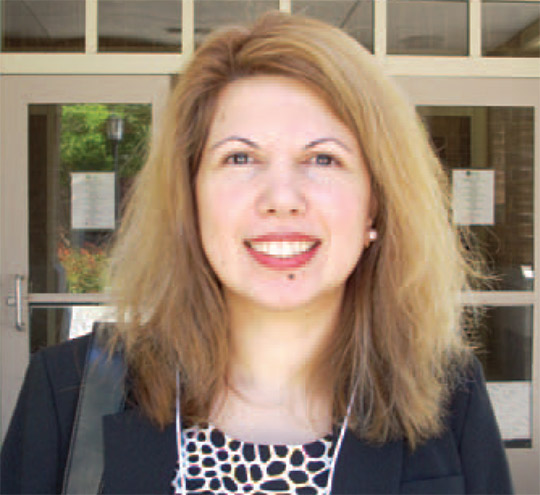Smiling to Keep Learning
Alumni Focus: Saadia Khan (Ed.M.'99, Ed.D. '12) is demonstrating that emotions have a major role to play in education.
By Joe Levine
If you ever visit an SAT test session and all the students are smiling, it probably won’t mean that test design has improved. Instead, you’ll know that Saadia Khan was right: smiling to induce recall of a positive memory can boost comprehension. If test-taking has moved into virtual environments by then, the students may be making their avatars smile, too. That will mean Khan was right again: virtual smiling also produces good results.
It’s no accident that Khan, a post-doctoral research fellow and adjunct assistant professor, is interested in the role of emotions in learning.
“My story,” she says, “is about learning to keep smiling. I want to help people regulate their emotions in learning because doing that helped me through some amazingly difficult times.”
Born in Pakistan – a country, she says, where even today education is “not a priority, especially for women and girls” – Khan was mentored by her grandfather, Ghulam Yasin Khan Niazi, Director of the region’s Board of Education and his tribe’s first member to earn a doctorate.
“He had a library, and I’d spend time there with him and his books,” recalls Khan, a small, blond-haired woman with a sparkling smile. “Normally the attention would have focused on my brother. But because he was truly an educator, my grandfather saw something in me, and we discussed ideas as equals.”
Khan grew up speaking Urdu, Punjabi, Saraiki and English. In college, she studied psychology, graphic design and computer technology. After founding a commercial graphic design firm, she came to the United States to earn a master’s degree at New York Institute of Technology and then an Ed.M. and Ed.D. at Teachers College. Ultimately she decided that her real métier lay in researching questions about learning itself.
At TC, Khan assisted the pioneering technology researcher Ernst Rothkopf. She worked at the College’s Institute for Learning Technologies managing a National Science Foundation project to develop a more design-focused, less math-driven curriculum for undergraduate engineering students. She completed her master’s degree, was accepted to the Ed.D. program and got married, to boot.
And then the world turned upside down. While Khan and her husband were visiting Pakistan, the attacks of September 11 took place. Khan was unable to return to the United States for several years, and at one point her brother died suddenly.
She made the best of “a very bad period,” teaching at Ali Institute of Education and winning a grant from the Canadian International Development Agency to integrate human rights and conflict resolution education into Pakistani schools.
“We trained principals and teachers, and the children’s attitudes changed,” she says. “It gave me hope that you really can bring about change.”
In 2005, Khan reconnected with Rothkopf, who helped her return to the United States. Back at TC, she teamed with John Black, TC’s Cleveland E. Dodge Professor of Telecommunications and Education, who has shown that digital technology can promote “embodied cognition” – a fuller understanding that flows from the learner’s ability to create both a mental and perceptual simulation of a concept or process (see story on page 26).
With Black, Khan has explored “surrogate” embodied cognition, or learning enhanced by the imagination. The two have shown that graduate students who supplement their reading of historical texts with avatar role-play in a virtual environment understand the material better and feel more motivated to learn. Khan has extended that line of inquiry with her focus on emotions. Her theory that positive feelings can also boost learning is solidly rooted in biology: a brain region called the amygdala is activated in both learning and positive emotion.
Recently Khan launched the New York chapter of the Immersive Education Initiative, a non-profit international consortium that’s defining and developing open standards, best practices, platforms and support communities for virtual reality and game-based learning and training systems. Black and Steve Peverly, Professor of Psychology and Education, serve on the chapter’s Board of Governors. Thanks to Khan, TC will host immersive education’s first research conference next year.
Khan credits her grandfather’s inspiration for much of her success. “When I was in Pakistan, I visited his grave, and I met a man, a former student of my grandfather, who’d brought his two sons to pay his respects. The man told me that he wouldn’t have made it to where he was in life without my grandfather’s help. That made me feel really good because that’s what life should be about – helping other people.”
Published Thursday, Jun. 27, 2013
